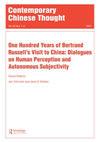对中国哲学研究方法论的再思考——从兑现“理念钞”说起
IF 0.4
3区 哲学
0 ASIAN STUDIES
引用次数: 0
摘要
本文将思辨或教科书式的哲学与放风筝的风险进行了比较,从而与反思的主题失去了联系。陈在这里捍卫的另一种选择,是对不太常被讨论的思想和寓言的一种更接地气、更具体、更想象的反思。他从四个相关的学科方法论中提炼出了这种方法:关注文本问题的“语文学”,关注过去时代的“思想史”,将过去的思想与未来联系起来的“经院史”(钱穆的一个术语),以及立即在中国寻找西方观念的“哲学史”。陈强调的是文本的原作者和后来的翻译的经验。这种方法也可以带来普遍的见解和无休止的解释性对话的乐趣。本文章由计算机程序翻译,如有差异,请以英文原文为准。
Further Reflections on the Methodology of Chinese Philosophical Research—Starting from Cashing in the “Bank-Note of Ideas”
EDITOR’S ABSTRACT This paper compares speculative or textbook philosophy with kite flying risking to lose touch with the topic of reflection. The alternative that Chen defends here is a more experience-grounded, concrete, and imaginary reflection on less often discussed ideas and on allegories. He carves out this approach from four related disciplinary methodologies: the “philological” focus on textual matters, the “history of thought” focusing on past eras, “scholastic history” (a term from Qian Mu) connecting past ideas with their future, and “history of philosophy” immediately searching Chinese equivalents for Western notions. The experience that Chen stresses is that of the text’s original authors and later interpreters. This approach can also leads toward universal insights and the pleasure of an unending interpretive dialogue.
求助全文
通过发布文献求助,成功后即可免费获取论文全文。
去求助
来源期刊

CONTEMPORARY CHINESE THOUGHT
Multiple-
CiteScore
0.10
自引率
0.00%
发文量
0
期刊介绍:
This wide ranging journal is essential reading for anyone who wants to understand the diverse themes and influences that shape Chinese thought today. It features translations of the most current and influential Chinese writings on all aspects of philosophical endeavor, from theoretical essays on systems to studies of China"s cultural and religious development, from interpretations of the Chinese classics to exegeses on Marxist thought.
 求助内容:
求助内容: 应助结果提醒方式:
应助结果提醒方式:


